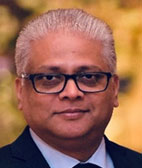
Dr. Naveed Akhtar
MBBS, FCPS (NEUROLOGY), FAAN, FESO
Senior Consultant/Vascular Neurologist
Associate Professor of Neurology, School of Medicine, Qatar University
Assistant Professor of Neurology, Weill Cornell Medicine- Qatar
Dr Naveed Akhtar joined Hamad Medical Corporation in March 2006, presently working as Head of Stroke Service at Neuroscience Institute, HMC. He is a fellowship trained (from University of Alberta, Canada) Vascular Neurologist.
His area of practice is mainly acute stroke care, stroke imaging and investigations, and stroke prevention. He also has keen interest in headache and related disorders, multiple sclerosis, and pain syndromes. He is also a Board Member of Qatari Board of Medical Specializations.
His main research interests are acute stroke care and intervention, stroke epidemiology, and biomarkers in acute stroke. He is the Principal Investigator of multiple prospective clinical trials at HMC. He has also a Lead PI of multiple Qatar National Research funded studies - in collaboration with Interim Translational Research Institute at HMC, Weill Cornell Medicine- Qatar, Qatar University, Hamad Bin Khalifa University and Qatar Biobank for many years. He is involved in various hospital-based database formation (including acute stroke, venous thrombosis, and hemicraniectomy in acute stroke). He has published more than 100 original research and review articles in peer reviewed journals.
Active Research:
- Diabetes and hypertension contribute to cerebral small vessel disease via enhanced activity of biomarkers, microparticles and exosomes: A prospective study in stroke patients and age-matched controls (NPRP 11S-0114 -180289)
- Increase repulsive guidance molecule-a (RGMa) in patients with lacunar and cortical strokes and its relationship to severity of the insult
- Pre-existing Small Vessel Disease in Patients with Acute Stroke and its clinical and radiologic outcome in acute stroke patients
- Identification of Novel Circulating miRNAs in Patients with Acute Ischemic Stroke
- COVID-19 related Strokes and its comparison to historical cohort
